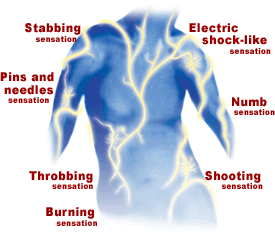Nerve Pain: Chiropractor Discusses The Common Non-Invasive Management Options. Would You Like To Speak To A Therapist? Call (24/7): 1300-003-777.
Your nervous system controls & regulates every process in your body like maintaining body temperature, activating sweat glands, contracting muscles and allowing your heart to beat. Your nervous systems consists of three different types of nerves:
- Autonomic – regulate involuntary and voluntary actions heart beat, digestion and respiration.
- Motor – control muscles via input from the brain, down the spinal cord to specific muscles.
- Sensory – facilitate touch and sensation of the skin.
When there are problems with the nervous system it can cause problems like nerve pain or neuropathy. This can be devastating and seriously alter a persons ability to function normally. Nerve pain and neuropathy can create a variety of symptoms depending upon the location of damage (brain, spinal cord, peripheral nerves) and type of nerves involved.
What Causes Neuropathy?
There is a long list of nerve pain causes. The most common that we encounter in Chiropractic practice include arthritis, disc herniation, disc bulge, inflammation, nutritional deficiency or toxicity, carpal tunnel syndrome, fibromyalgia, spinal misalignment, diabetes, trigeminal neuralgia, multiple sclerosis, shingles, guillain barre syndrome, physical trauma, myasthenia gravis, motor neuron disease, lupus, infection, spinal fracture and tumor growth. Chiropractors and other allied health professionals are ideally placed to assist sufferers of nerve pain through gentle manual therapies.
Neuropathic Pain Signs & Symptoms
If you’re suffering from any of the below signs & symptoms it’s recommended that you consult with your doctor or allied health practitioner for prompt assessment and management advice.
- Muscle weakness
- Burning pain
- Tingling & numbness
- Muscle twitching
- Loss of muscle size (atrophy)
- Sharp, shooting aching pain
- Electric shock pain
- Total muscle paralysis
- Partial or complete reflex loss
Neuralgia Treatment
There are a plethora of available treatment options for people suffering from nerve pain. Below we’ve included the top three.
CHIROPRACTIC
MEDICATIONS
SURGICAL INTERVENTION
Chiropractor Nerve Pain Research
- Clinically significant improvements were noted in pain and overall disability following Chiropractic management in individuals suffering symptoms of lumbar radiculopathy highlighting the viable option of using it as a nerve pain treatment. Murphy, D.R., Hurwitz, EL., McGovern, E.E (2009). A nonsurgical approach to the management of patients with lumbar radiculopathy secondary to to herniated disc: A prospective observational cohort study with follow up. Journal of Manipulative & Physiological Therapeutics, 32(9); 723 – 733
- Conservative Chiropractic management produced favourable outcomes for majority of patients suffering radiculopathy in a hospital setting. Christense, K. et al (2008). Chiropractic outcomes managing radiculopathy in a hospital setting : A retrospective review of 162 patients. Journal of Chiropractic Medicine, 7(3); 115 – 125

